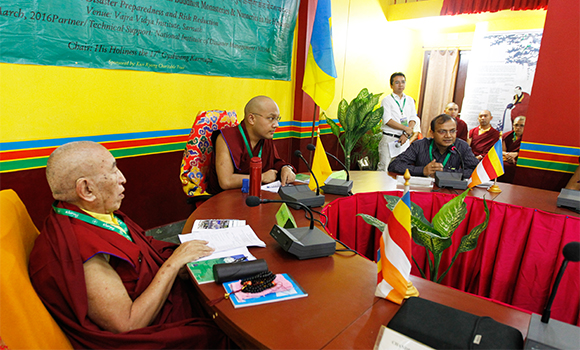
21 March 2016 —Vajra Vidya Institute, Sarnath, India
From March 21 to 24, the Gyalwang Karmapa convened a conference for representatives from his environmental organization known as Khoryug (Tibetan for environment). Over sixty monks and nuns came from 55 monasteries and nunneries from across the Himalayan region. Along with a few members of the lay sangha, they all hail from India, Nepal, and Bhutan. Acutely conscious of the devastation caused by earthquakes in Nepal and Sikkim, last year representatives at the 6th conference requested training in disaster management so that they could be of real service during these difficult times. Sharing their concerns, the Karmapa readily agreed, and a partnership was made with Indian Government’s National Institute of Disaster Management, which sent two senior officials to participate in this conference.
The first welcoming speech was made by Khenchen Thrangu Rinpoche, the abbot of Vajra Vidya Institute, where the first gathering on the environment took place in 2009. He related that when he was young in Tibet, he did not know about the importance of environmental work. Recently, however, large earthquakes in Jyekundo and then in Nepal made clear to him how critical the natural world was. These days, Thrangu Rinpoche mentioned, he sees a daily report on earthquakes from around the world, which states that there are some 150 each day, creating great danger and fear. This makes clear, he said, that preparing for them is not only important but also an urgent situation that impacts all levels of life. Thrangu Rinpoche thanked the people working in this area of disaster relief and requested them to continue their beneficial activity.
The Gyalwang Karmapa then addressed the group, first speaking of the 6th Khoryug conference last fall and the decision made to set the topic of disaster management for this 7th conference. He said, “The fact that the Government of India’s National Institute of Disaster Management has consented to be involved gives us courage in our work. We were all affected greatly by the earthquake in Nepal and wanted to know how we could help, he notes, so that we are not just taken by fear, but prepared to be useful and deal skillfully with the situation.”
As the situation is very clear, it goes without saying, the Karmapa stated, that we need to study and train ourselves. He made the aspiration that the four days of the conference go very well. In the future, he hoped that each monastery could create an emergency team, which would help not only the monasteries but also the people in the surrounding areas. It is important, he noted, that our thinking is on a wide scale.
The rest of the day was spent giving an introduction to the different aspects of disaster management. Dekila Chungyalpa presented an overview of Khoryug and its goal of practically applying the Buddhist values of compassion and interdependence to the earth and all the living beings who dwell there. The earth, she noted, is a living system that needs to be protected. Turning to the future, she said that Khoryug plans to build up the monasteries to become hubs of knowledge for the local communities, able to educate them on disaster preparedness, response, and recovery.
The next presentation was from Rajesh Kumar Singh, Joint Director of the National Institute for Disaster Management, who spoke of the importance of preserving cultural heritage. He gave several reasons for this: Cultural artefacts ensure a community or country’s identity in a global environment; it offers the opportunity to preserve past and define the future; and it is source of a people’s roots as well as representing the culture as a whole. He also noted that in addition to having an immense educational value, cultural monuments, when protected, naturally lead to protecting the environment around them. They also prove the presence of a tradition for many centuries, even thousands of years. Speaking of human induced and natural hazards to cultural traditions, he concluded by stating that disaster management functions on many levels from the national to the very local.
Reports then followed from the three countries on their activities for the past year, involving tree planting, waste management, rain water reservoirs, solar energy installations, composting, water filtration, cleanups, and education about the environment in the local communities.
When she gave her talk, Ms. Chandrani Bandyopadhyay, Assistant Professor at the NIDM, noted that these projects of Khoryug were excellent and belonged to the category of mitigation, one of the four that she presented. Mitigation is a longer term preparation to lessen the impact of negative events, she explained. Preparedness involves the shorter-term actions that one could take, for example, making a first aid kit. Response, she said, has to do with how well one relates to the actual event, and finally, there is recovery afterward. In breaking down disasters into these categories, she make it clear that a disaster is not a foregone conclusion. We can prepare and reduce the negative consequences. On this hopeful note she ended her presentation.
The day closed with a report from Nepal on the monasteries experience of helping out with the consequences of the two earthquakes and what was learned. In the next three days, the conference will cover risk assessment, actual responses to disaster, and recovery along with management plans. In this ways the attendees will have the full picture of how to help people before disasters arise, while they are happening, and how to help with recovery afterward.


